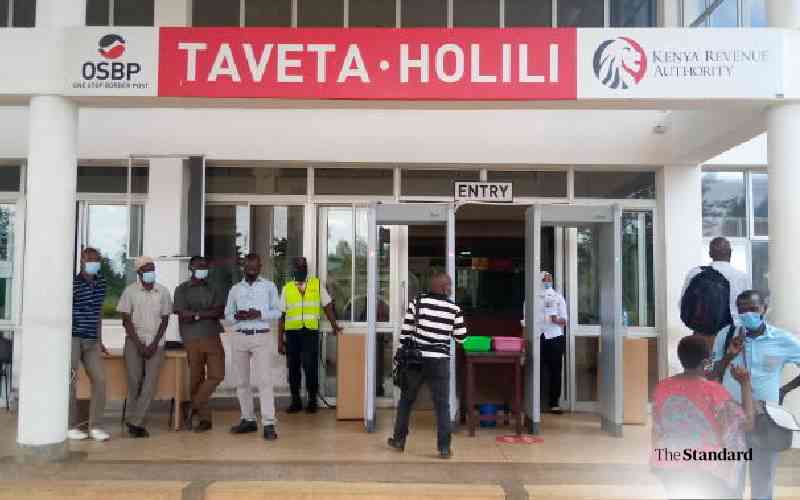
Kenya and Tanzania authorities held a joint cross-border consultative meeting aimed at strengthening security surveillance along the porous Taveta border.
The Thursday meeting comes amid concerns of high cases of smuggling and human trafficking syndicates, among other illegal activities along the border.
Hundreds of young men and women from Ethiopia, Somalia, and Eritrea are finding their way into South Africa in droves through Kenya in search of employment.
Tanzania has been ranked the leading transit corridor for illegal immigrants from Central and Eastern Africa sneaking to southern Africa to seek economic fortunes.
The porous border has also become notorious as a major conduit point for smuggled vehicles, motorbikes, hard-core drugs, Ethanol, and Methanol, among other illegal goods from the neighbouring country.
In the recent past, immigration officials in Dar es Salaam had raised an alarm over the increasing numbers of illegal immigrants sneaking into Tanzania through porous border points in Kenya, Rwanda, and Burundi.
Reports also indicate that South Africa and Mozambique have also been identified as the destinations for immigrants from East and Central Africa.
According to officials, the high-level meeting held at Holili border town in Tanzania was attended by Kenya's senior government officials from the Office of the President and their counterparts in Tanzania.
It was attended by Taita Taveta County Commissioner Ms Josephine Onunga and County Police Commander, Jonathan Koech.
Ms Onunga confirmed the meeting took place at the Holili border town but promised to release details later.
Koech revealed the cross-border meeting was planned in Nairobi.
“I attended the meeting, but I am new to this county. The issue with international borders is planned in Nairobi,” he said.
But intelligence sources said the meeting centered on joint cross-border surveillance and security operations between the two countries to tackle emerging and intricate criminal activities.
“We discussed cross-border surveillance and how we can strengthen security jointly at the porous border that has been hit by cases of human trafficking and smuggling of goods, which has denied both governments revenue,” said the source.
Stay informed. Subscribe to our newsletter
The meeting also comes at a time when Kenyan traders have constantly complained of harassment and arrests in Tanzania while doing business.
“What is baffling us is that Tanzanian traders are doing their business freely in Taveta town, but when we go to their country, we are being harassed, arrested arbitrarily, and our goods confiscated,” a trader Amina Saida.
She spoke recently during a public meeting with Internal Security Cabinet Secretary Kipchumba Murkomen in Mwatate town.
“Taveta town is flooded with cheap farm produce from the neighbouring country which has denied us a market for our local produce.
The East African Common Market Protocol is only favouring Tanzanians at the expense of Kenyans and it needs to be reviewed to provide a level playing ground for all EAC citizens,” Ms Saida had told Murkomen
At the meeting Taveta legislator John Bwire told the CS that 70 percent of the town’s construction work is done by Tanzanians.
“We have become liberal. Our town has become a city for Tanzanians,” said Bwire.
Senior Kenya Government officials and those from the International Organization for Migration (IOM) Tanzania chapter have also decried the growing number of people sneaking into Tanzania on their way to South Africa and Mozambique.
Recently, the IOM representative in Tanzania, Enna Lutengano, said that human trafficking cases have reached alarming levels in Tanzania following the interception of illegal immigrants on their way to Southern African states.
It is estimated that over 12,000 illegal immigrants pass through Tanzania to Southern African countries every year, mostly from Ethiopia, Somalia, Burundi, and Rwanda, said the IOM.
Immigration reports show that 1,840 Ethiopian and Somali immigrants have been intercepted in Tanzania in the recent past, with the porous borderlines between Kenya and Tanzania being identified as the key entry points for Ethiopian and Somali immigrants.
The county has been prone to human trafficking of illegal immigrants, with senior government officials and human rights groups decrying the rising cases of human trafficking.
Onunga confirmed that the number of Ethiopians being arrested in the country has been on the increase in the recent past.
She revealed that security and immigration officials have so far arrested over 100 Ethiopian aliens this year, mainly Ethiopian youths below the age of 20 years.
Dozens have been charged and jailed while others paid fines and were repatriated to their country of origin, said the administrator.
Onunga blamed the rise in aliens in the region on human trafficking networks that have been perpetrating the vice.
“I can authoritatively disclose that we arrested over 100 Ethiopian nationals in the county this year and the problem has been compounded by the civil strife in Ethiopia.
"We will now allow trafficking agents to use the county as an exit route for aliens from Ethiopia to South Africa,” the administrator warned.
 The Standard Group Plc is a
multi-media organization with investments in media platforms spanning newspaper
print operations, television, radio broadcasting, digital and online services. The
Standard Group is recognized as a leading multi-media house in Kenya with a key
influence in matters of national and international interest.
The Standard Group Plc is a
multi-media organization with investments in media platforms spanning newspaper
print operations, television, radio broadcasting, digital and online services. The
Standard Group is recognized as a leading multi-media house in Kenya with a key
influence in matters of national and international interest.
 The Standard Group Plc is a
multi-media organization with investments in media platforms spanning newspaper
print operations, television, radio broadcasting, digital and online services. The
Standard Group is recognized as a leading multi-media house in Kenya with a key
influence in matters of national and international interest.
The Standard Group Plc is a
multi-media organization with investments in media platforms spanning newspaper
print operations, television, radio broadcasting, digital and online services. The
Standard Group is recognized as a leading multi-media house in Kenya with a key
influence in matters of national and international interest.


